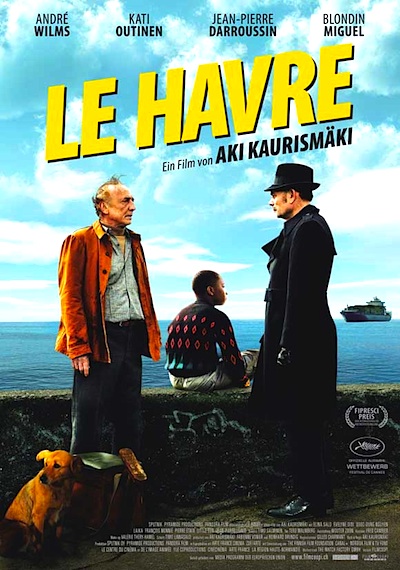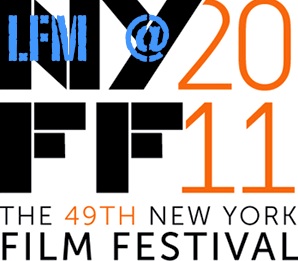 By Joe Bendel. As the home of smugglers and cutthroats, ports are always the perfect setting for hardboiled crime drama – not, however, Aki Kaurismäki’s Le Havre. It’s nothing like the French film noir cities of Henri-Georges Clouzot, perhaps because Kaurismäki is Finnish. Instead, these marginalized roughnecks of Le Havre inhabit a quietly whimsical and deeply humanistic community in Kaurismäki’s Le Havre (trailer here), which screens during the 49th New York Film Festival.
By Joe Bendel. As the home of smugglers and cutthroats, ports are always the perfect setting for hardboiled crime drama – not, however, Aki Kaurismäki’s Le Havre. It’s nothing like the French film noir cities of Henri-Georges Clouzot, perhaps because Kaurismäki is Finnish. Instead, these marginalized roughnecks of Le Havre inhabit a quietly whimsical and deeply humanistic community in Kaurismäki’s Le Havre (trailer here), which screens during the 49th New York Film Festival.
Marcel Marx works the streets as a shoe-shiner in the tradition of Jacques Tati. He never had much money nor any worries before his beloved wife Arletty is hospitalized. Shielded from her fatal prognosis, he is at loose ends puttering about the waterfront, until he chances across Idrissa, a young illegal African immigrant hoping to be reunited with his parents in England.
Initially, he merely leaves some food for the boy. Then he opens his home to the sad-eyed Idrissa. Before long, Marx (hmm, heavy name, that) and his salt-of-the-earth comrades are working in concert to help their furtive guest elude Monet, the dour flatfoot.
Granted, a thumbnail description of Le Havre probably sounds unappetizingly didactic. However, Kaurismäki astutely employs a light touch with the material, emphasizing the inherent innocence and charm of Marx and Idrissa. Unlike far too many filmmakers, he seems to understand the old adage about catching more flies with honey. He also recognizes and capitalizes on the considerable charisma of his proletarian leads.
 The twinkle in André Wilms’ eyes could light up a city block, yet he still invests Marx with a wonderful sense of dignity and a genuine élan. In contrast, Jean-Pierre Darroussin is his near total inverse as Monet, projecting an exquisitely French fatalism. As a bonus, cinematic Francophiles should keep their eyes peeled for Truffaut and Godard regular Jean-Pierre Léaud in a brief but fittingly idiosyncratic cameo.
The twinkle in André Wilms’ eyes could light up a city block, yet he still invests Marx with a wonderful sense of dignity and a genuine élan. In contrast, Jean-Pierre Darroussin is his near total inverse as Monet, projecting an exquisitely French fatalism. As a bonus, cinematic Francophiles should keep their eyes peeled for Truffaut and Godard regular Jean-Pierre Léaud in a brief but fittingly idiosyncratic cameo.
Yet, it is the look and feel of the city itself that will dominate viewers’ impressions of the film. Cinematographer Timo Salminen gives Le Havre a warm glow that is inviting and nostalgic, while the back alleys rendered by Wouter Zoon’s design team look ideally suited for dancing in the rain.
Though never tackily melodramatic or cloyingly quirky, Le Havre has to be one of the most heartfelt, unabashedly old-fashioned films to carry major festival laurels this year. Regardless of politics, it is hard not to be swept along by its effervescent spirit. Definitely recommended, it screens Sunday (10/2), Monday (10/3), and Wednesday (10/5) as a Main Slate selection of the 2011 New York Film Festival.
Posted on September 29th, 2011 at 1:11pm.